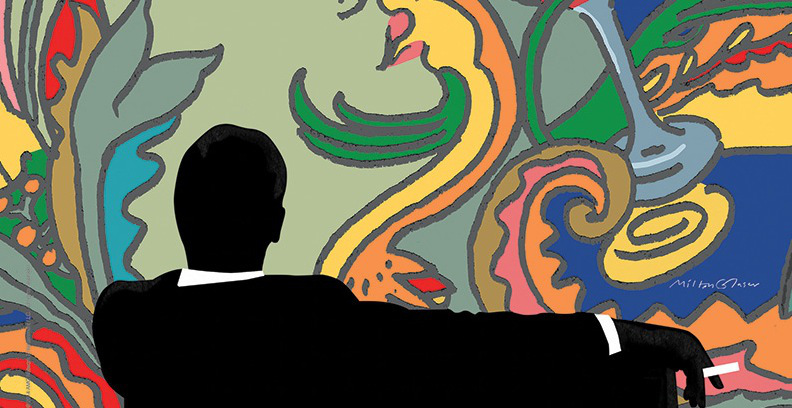The trade papers are full of copy about the Emmy awards: nominating ballots are due in to the Television Academy on Friday. The amount of money spent on the advertising of For Your Consideration ads, plus campaigns for shows that will never be nominated, it’s all out of control. The Emmys are also kind of a static deal– the same things, people, get nominated over and over. By now everyone on “Modern Family” has a mansion full of statues. I’ve never watched an entire episode. What can you do?
Here are a couple of thoughts: “Mad Men” only had seven episodes this season but they were hugely impressive. Jon Hamm is overdue for an Emmy, and so is John Slattery. Christina Hendricks and Elisabeth Moss had excellent material in this short season.
The writing, particularly in the 5th, 6th, and 7th episodes was far beyond anything else from American TV. Matt Weiner deserves all the Emmy praise we can heap on him. My favorite moments: John Slattery in the opening orgy scene, later going to see his daughter in a commune– outstanding. Jon Hamm sitting in a little chair in the copy room while we he waits and waits for Roger Sterling (Slattery) or someone to show up. Hamm looked a like an adult who’d returned to grade school. It was so uncomfortable, you could feel it through the screen. And the Man vs. Machine episode about the introduction of the computer into Sterling Cooper had incredible religious overtones. I hope “Mad Men” and all its players are front and center this year.
“Veep” is the best comedy on TV. This season was sublime, of course. Julia Louis Dreyfus can do no wrong as Selina Meyer, the Michael Scott of politics. Armando Iannucci is a genius. His movie “The Loop” is worth seeing as a blueprint for all this governmental zaniness. I’m in love with Anna Chlumsky’s Amy. Also, Reid Scott has really come into his own as Dan. Why isn’t Kevin Dunn more celebrated as a supporting actor? The highlight of the season: Selina’s hair cut. How will she ever become President of the United States? I long for and dread the next season.
Steven Stoute got famous in New York for being a record executive beaten over the head with a Champagne bottle by Sean Diddy Combs. Those were the wild days of hip hop and rap. Things have progressed so much that Combs actually sat for an interview and was thoughtful in a VH-1 doc series called “The Tanning of America: One Nation Under Hip Hop.” Emmy voters can put this into the non fiction category. Do it. The series is terrific on how rap and hip hop were born and came to influence fashion and politics. I was knocked out by it.
In “The Tanning” we get some startling face time with rap mogul Rick Rubin, who never ever does interviews. Mariah Carey gives an extremely insightful moment into how she changed from Tommy Mottola’s ballad queen into a hip hop queen. And you’ll see rare footage of Combs himself interviewing Barack Obama when he was running for Congress. You can see Combs falling in love with him on camera. The rest of the country followed.
I spoke with Stoute yesterday from Cannes, where he’d just spoken to at the Cannes Lions advertising conference. He arranged for a whole session on hip hop and its power in the marketplace. He was with Kanye West at the Hotel du Cap in Antibes. “He’s never been here before,” Stoute told me. “He can’t believe it.”
He’s come a long way from his famous scuffle with Puffy in the bad old days, I said gently. “Having kids has changed everything,” he replied. “It changes everything.”
Stoute says of the four part doc: “It’s been an unbelievable journey. We started it from the 70s, and you have it give it a little time.” The doc played on VH-1 he said because “I wanted to connect with a large audience. We got a million people to watch it. That’s a big deal. It’s not a documentary that chronicles the hip hop you already know.”
Stoute cited Combs and Mariah Carey among others as standouts. And Dr. Dre, who’s become a billionaire with the Beats-Apple deal since he made the film. And that deal proves the whole point of his mini series, Apple, the biggest company, is now tanned.
Who was his favorite? “Norman Lear,” he said of the TV innovator who brought race and black life into living rooms for the first time. Lear gave us “Good Times” and “The Jeffersons,” two shows that everyone in the doc still cite as influential. Said Stoute: “His take on it was so fresh. He’s been doing this for 40 years. I appreciate his courage.”
Emmy voters, take heed.

